“I’m not a teacher.” “I don’t have the educational background, the subject knowledge, or the patience to homeschool my kids.” These are more than likely some of the first thoughts you had as a parent when you heard about the coronavirus (COVID-19) outbreak and lockdowns. While many of us did not plan to homeschool our kids, it is the reality many of us are facing now. With school closures all across the country due to the novel coronavirus (COVID-19) outbreak, many parents have found themselves working from home along with a new side gig: teacher. With lockdowns still in place, children around the world are having to get used to their new classroom: home.
Parents with children, especially younger children in school, are feeling the time crunch at home as they try to balance work, domestic life, and other household responsibilities, as well as taking care of their kids and attempting to homeschool them during the 2020 coronavirus pandemic. This is new territory for all of us, especially as social distancing becomes the new normal and virtual working and learning spaces replace the real thing. School districts have a legal obligation to provide equitable learning opportunities and it can be hard for schools to guarantee access to necessary hardware, like laptops and WiFi, for all students, so some are confining themselves to handing out optional “enrichment” lessons.
Getting Started with How to Homeschool Your Kids During Quarantine
Thankfully, there is a lot of advice out there on how to homeschool your kids, both from various organizations that want to help, as well as from parents who have been doing it for years. Luckily for you, we’ve compiled the best of the best for you and have added some of our own ideas as well. If you are one of the tens of millions of parents who are now essentially having to homeschool your kids, we have some tips and advice to help you keep your kids engaged and everyone sane while you homeschool during this time of uncertainty. And let’s face it, your children will never forget this time spent in quarantine together. Learning as a family has the power to inspire new interests and to create lifelong bonds among siblings, and we are here to teach and guide you through the process.

What to Keep in Mind When You Homeschool A Young Child
As a parent of a child in elementary school, you may feel the most pressure to be super hands-on with homeschooling. Younger children do need more help with structure and often have a lot less of a time-span in terms of their focus. However, for elementary-school-aged students, the details of the way this temporary time will be spent learning at home do not matter much, so long as they are continuing to learn. By the end of elementary school, kids need the following skills: They need to be able to read, to do math through the point at which they are ready for pre-Algebra, to write short, coherent essays, to know a smattering of history and their current cultural position in space and time, to understand basic science, and to use logical reasoning to assess facts and come to a conclusion.
Remember That Everyone is in the Same Situation
Do they need to know specific facts? The more simple answer is some, but with reason. They should know a bunch of things about the world so that they are culturally literate and able to move around in the world. Kids who miss weeks or months of elementary school while the rest of their classmates are still in school can experience adjustment problems when they return to the classroom, because of a perceived need to catch up with what their peers know.
In the case of everyone missing school because of a pandemic or other natural tragedy, though, no such issue exists as everyone will be in the same boat. Thus, the most important and useful thing you as a parent can do to help your elementary school child during this time is just to help them continue to learn, even if it sways from the material the school may be recommended. Try to promote learning in new ways that they may not necessarily be taught in school. This is a great time to experiment.
It Is All About Your Attitude
Here is a simple question that may help you focus while trying to homeschool your kids during COVID-19: A year from now, in 5 years, in 10 years, in 20 years, what story do you want your kids to tell about this experience? There is no doubt that we are living through a historic time in our lives, that we and our children will never forget. Because we are living in a time of uncertainty with no real clear end-date, it is important to remember that this will all be over one day. Although it may be hard, some days more than others, try to have a spirit of we are all in this together adventure. Try to make the best out of this situation and have a great attitude. Moreover, remember that everyone else is in the same situation.
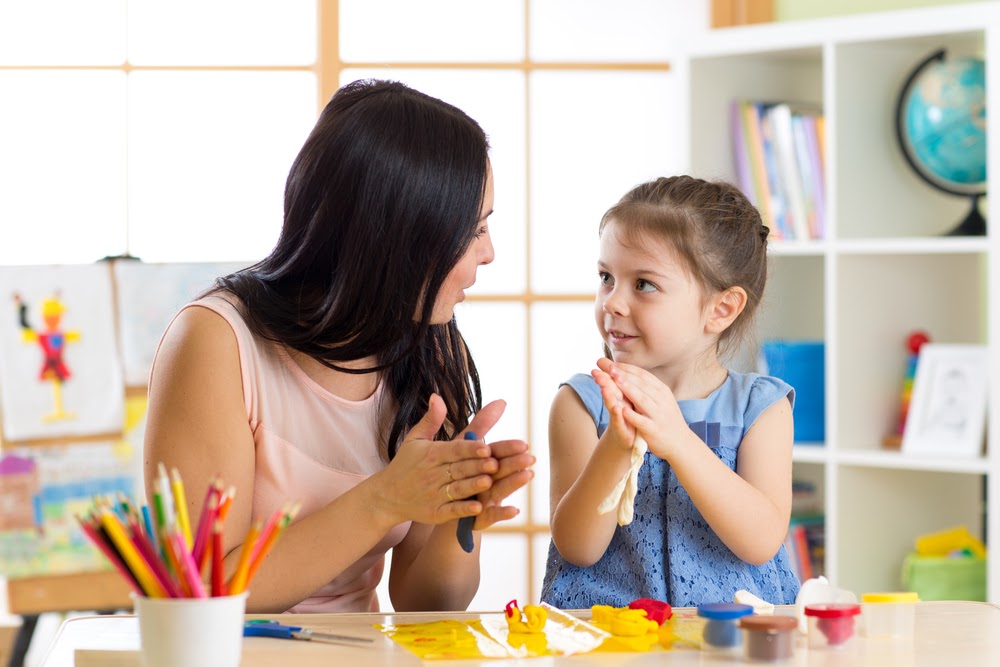
Try to make the best out of this situation and have a great attitude.
Get Your Children To Teach You
Now, this may sound a little strange at first, but there are many benefits to this. In a Twitter thread about how to homeschool effectively during the lockdown, British psychotherapist and author, Philippa Perry recommends letting your children teach you first.
As you start the process and begin the journey of helping your child be educated at home, start with the easy wins by focusing on the stuff your kid is good at. This will help set the tone for the rest of the time you are stuck at home. Have them teach you what THEY know; you’ll be surprised and delighted that they will teach you new things, and that can get you on the right foot. It reminds kids that learning is lifelong and lovely.
Learning by Example
It may be hard for your child to adjust to you being their new teacher, at least at first it most likely will be. Allowing your child to teach you first is seen as a way to establish a new learning environment. If a child sees you, their now parent-teacher, sitting quietly and listening to what they have to say, they are more likely to reciprocate and view the living room or the kitchen counter as the new “school” or place to learn. Perry wrote in the thread: “Get them to teach you something, anything. You then model how to learn and listen, also teaching something to someone else helps them to learn it. This is great for all ages.”
One of the best ways to teach your child is by example. If they see you learning from them and listening to what they have to say, they are more than likely going to do the same while you are teaching them. Perry also notes that “teaching something to someone else helps them to learn it.” This is especially a great point for parents with younger children who are still developing learning skills and discovering new things. Moreover, children can learn a great deal from other experiences and insights.
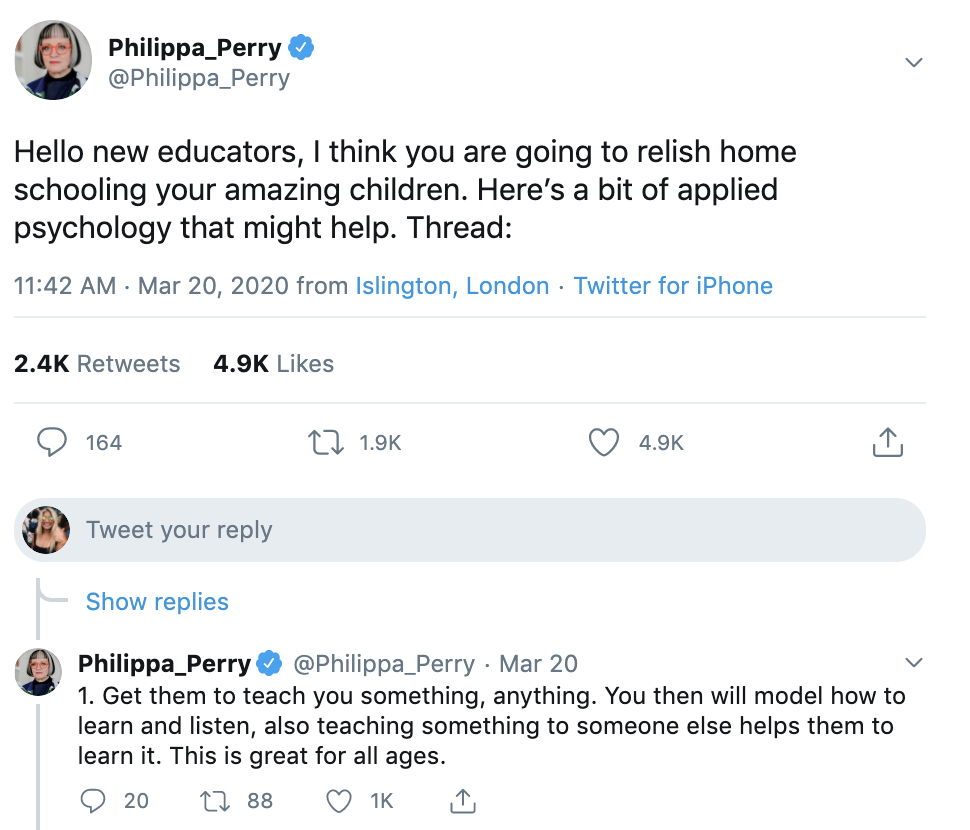
Philippa Perry, British psychotherapist and author, shared a thread on Twitter of advice for how to thrive (and survive) while you homeschool your kids during COVID-19.
Develop a Relaxed Schedule for Kids to Follow
During this time of uncertainty, it is good to keep some sort of routine. Developing a fluid and relaxed schedule for your kids to follow with help keep you and your kids on track. Creating expectations and set times will help everyone. Now, you should not expect your kids to be engaged in academics all day, that is just not realistic. But, having them get up, showered, and eating breakfast before you start on schoolwork, is a great way to start the morning every day.
Be sure they check their email and school accounts and have reading time. Some kids, especially those who are a bit older, may be able to self-pace and self-motivate themselves to start their day and do their work. Meanwhile, younger ones may need more structure and help to schedule their day. It is important to keep in mind that younger children may only be able to focus on a task for 10 to 15 minutes. So, take lots of movement breaks, sing songs, shake out the sillies, and go outside when you can.
Designate Space and Time For Homeschool Learning
Delegate Certain Areas of Your Home
This goes along with developing a schedule for your kids to follow. It is important to designate space and time for learning. Kids have a lot of built-up energy and may need to move around throughout the day, however, it is best to have one or two designated areas dedicated to learning. Ana Homayoun, an educational coach for students in the San Francisco Bay area, suggests that you use a tray or basket for supplies. Have your kids pack up their materials into a basket so they can put them aside when they are finished. This will keep things neat and tidy.
Moreover, make sure it is quiet and there are no other distractions during your learning time. Make it feel like they are still going to school, and have some rules in place. Sticking to a routine and having a place dedicated to learning will help your child focus and know when school time is versus when playtime and relaxation time is. The dedicated space will start to feel like a learning place. Remember that the goal is to keep up the momentum of learning, not to imitate school.
Plan Time for Homeschool Learning
The same goes for time. While it is good to have a general daily routine, you can also be flexible. It is okay to let your kids sleep in a little later than usual — research shows many of our children and teens are chronically sleep-deprived. Some days your child may not have the energy or attention span for learning that day.
It is okay to make adjustments and change things up. Plus, most homeschoolers do not teach seven hours straight a day. Shoot for two to four good academic hours instead. It is understandable that as parents, you may worry about keeping your children on track academically, but you are likely to find that your children are able to complete their course work in much less time than in a typical school day. By taking the pressure off yourself to be the teacher and curriculum enforcer, you may be pleasantly surprised by just how much your children learn.
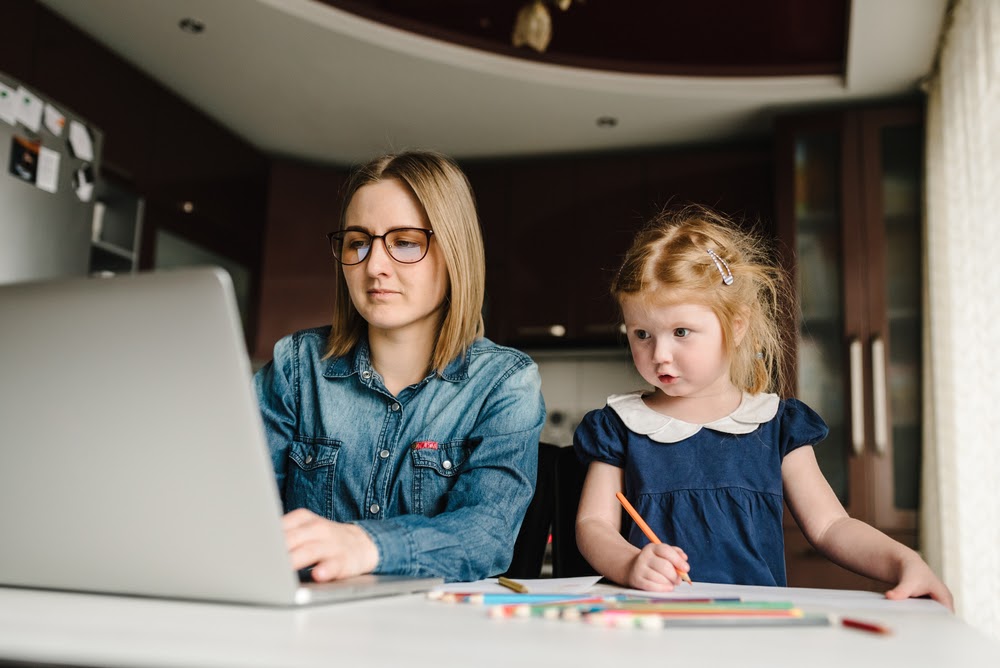
Designate specific space and time for learning.
Cater to Your Child’s Learning Style
You are the best judge of character and you know your kid better than anyone. To help your child succeed, it is important to cater to their strengths and needs during this time. Every student learns differently. While some students thrive in reading or writing, other students learn more effectively through hands-on activities. Understanding how your child learns best is a large part of helping your child perform to his or her fullest potential. Therefore, it is important to know how to determine your child’s learning style.
Try to test different techniques and ways of learning, as some may work better than others for your child’s learning style. There are four main learning styles: visual, auditory, reading/writing, and kinesthetic. Many students use a combination of the four, but typically have one that works best for them. Using the right study and teaching methods will make all the difference in the world when it comes to your child understanding, retaining, and remembering the material you are helping teach them. By knowing your child’s learning style, you can choose effective study methods that complement their strengths rather than work against them.
Every Child Learns Differently
Strong learners can do even better independently, but weaker learners may really struggle. Online and independent learning can be very different and very difficult for a lot of people to learn, even adults. It takes a lot of self-regulated learning skills.
Different kids will do best in different learning environments. And if you don’t know what your child’s learning style is, simply ask them how they learn best. Philippa Perry said, “If you go the way they believe they can learn, they will be more likely to.” If your child learns better in pairs or groups, try a Zoom, Skype, or Google Hangout study session with a fellow classmate. As a rule of thumb, the older the child, the longer they may be able to work on their own. It is all about trial and error and finding the best methods that help your child.
If something is not working, STOP and try something else. This is the time to experiment with different types of learning. And remember, resources are going to become available slowly for students who need them — you may not have to do this all by yourself. Do not worry about your child “falling behind.”
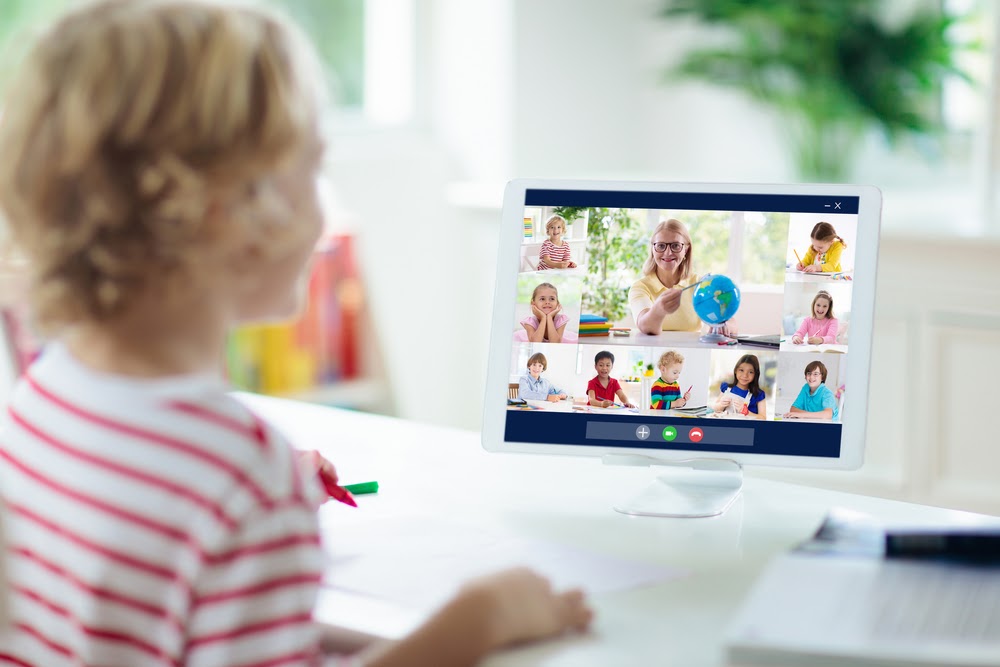
Ask your child how they learn best and cater to those needs. If you go the way they believe they can learn, they will be more likely to. If your child learns better in pairs, let them video chat with a fellow pupil or group of classmates.
Do Not Forget That You Are a Student Too
Homeschooling is a new and foreign concept for many parents. You do not need to plan extensively and you do not need to be an expert in any subject. You are a student just like your child. It is okay to not know the answers. It is okay to reach out for help. There are tons of online resources available, too. You have everything you need at your fingertips… literally. The internet offers a vast network of support for every academic subject imaginable. We are all in this together, do not worry you can do this! Your kids do not need you to be perfect, just to be there for them and support them through this process.
Talk To Your School and Parent Community About How to Homeschool Your Kids
Districts are still trying to figure things out. It is best to talk with your school if you need more flexibility for whatever reason, whether that be emotional, physical, or financial. The amount of free online resources can be extremely overwhelming, so taking with your kids’ teacher and parent community can be very beneficial. Moreover, the parent community can be extremely helpful during this time. Reach out to see what other parents are doing and see what methods are working for them.
Go Off on Tangents When You Homeschool
If a particular subject matter sparks an interest with your child, it is okay to go off on tangents and explore it in more depth. You do not have to stick to your specific ‘lesson plan’ to a tea.
Get Creative With What is Available
As the old saying goes, “when life gives you lemons, make lemonade.” This is a great time to think outside the box and let your child know that there is not just one way to learn and that learning can actually be quite fun. It is time to put your thinking cap on and get creative with what you have readily available in your home and around your neighborhood. Moreover, every ‘lesson’ does not have to correlate with the typical lessons your child would be learning in school. Teach your child about the world around them and present life lessons in inventive ways. If there is something you are passionate about, teach them about that too! So long as they are learning and using their brains, you are doing something right.
The UN recently shared some fun home learning activities to help teach your children about plastic waste. From making instruments out of discarded bottles to putting on a “rubbish” fashion show, not only are these activities cost-free, they might actually help you to upcycle and reduce your plastic waste.

To view the UN’s ideas of what you can do with your children at home to teach them about the plastic pollution problem, check out their website here.
This is a Great Time to Try New Things
There is a lot of pressure on students to achieve in school, and often the goal of education is lost. The focus becomes memorization and test-taking rather than learning, growing, and finding your talents, passions, and personal goals. It is easy to forget that students work up to their potential when they are passionate about the subject matter they are studying. Using passion projects can help your child learn to love learning. And learning does not have to just relate to schoolwork.
Now, more than ever is a great time for kids to pursue interests they have not had time to focus on the past, and possibly even discover some new ones. It could be cooking, building legos, drawing, writing, painting, doing DIY science experiments, or learning an instrument. Look for your child’s natural abilities, but do not stop there. Push them to try new things, and even do them along with them. Encourage your kids to be creative and to share their wonderings. You never know what you may discover. As an added bonus, if it is something they are truly interested in and passionate about, you will not have to nag them to do it, they’ll do it all on their own. Plus, there is an added bonus that you may get some alone time or time to yourself.
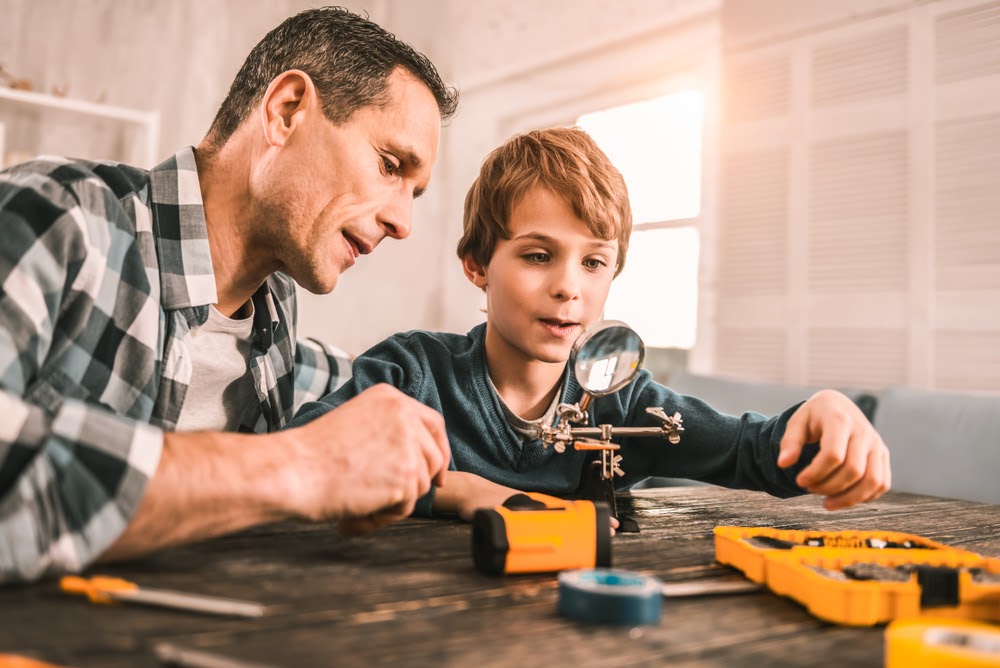
Use passion projects to help your child learn to love learning.
Take Time To Go Outside
While social distancing and stay-at-home orders are still in place, it is important to get fresh air and take time to go outside. The amount of time you go outside is not as much what matters, so long as you do it. Play catch in the backyard, talk a walk around your neighborhood, throw a frisbee for the dog, take a bike ride, play hopscotch, have a dance-off, or draw with chalk on your driveway. You’d be surprised what you and your kids can come up with.
It is good for everyone’s peace of mind, especially for kids. Being cooped up inside, especially for kids that are extroverted or have a lot of energy, can be difficult. So make sure you take some time to leave the house. Also, establishing healthy habits early sets the stage for a lifetime of wellness for your child. It is important to encourage exercise, plus, it’ll help them learn more! It will be easier to focus on work when kids (and parents) have their need for physical movement met. Do not forget, learning happens outdoors too.
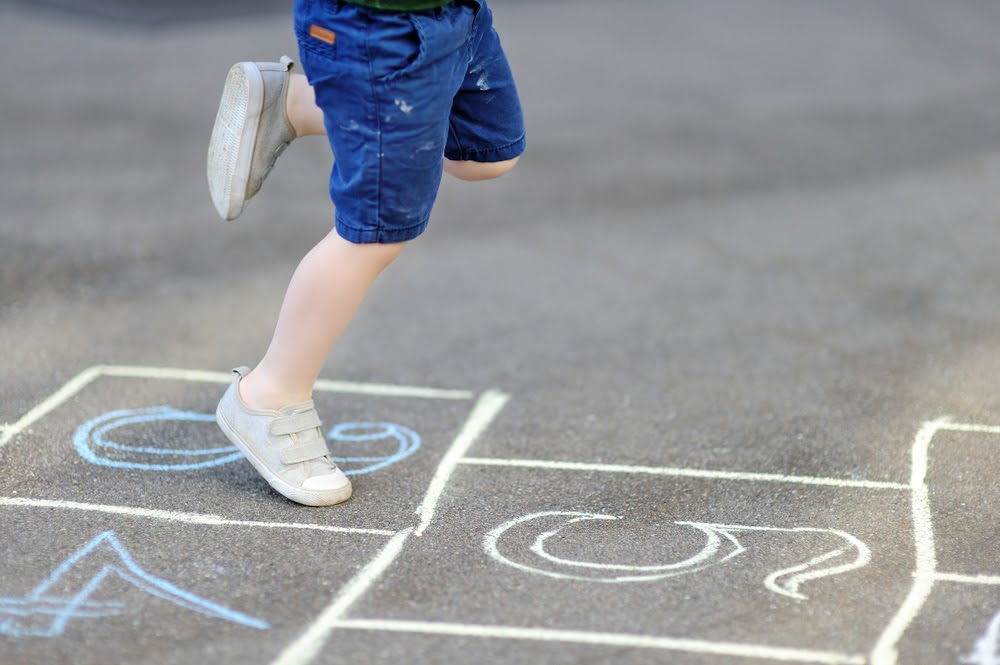
Be sure to get outside and breathe fresh air. Get your creative juices flowing and just have fun. Besides, hopscotch is a great way to practice counting!
Prioritize Play and Unstructured Time
Education expert and mother of four homeschooled children, Kerry McDonald gave some advice in regards to the daunting task of homeschooling during this time. Children are often able to complete their coursework in less time than a typical school day, which is extremely important to realize. With that being said, do not try to force the learning for longer than necessary. It is important to allow children time for unstructured learning, play, and virtual time with friends. As a parent, be sure to create space for free play without directing their activities.
Playtime is Vital for Kids
In fact, playtime is vital for children’s healthy development and it may be particularly important as we confront this pandemic. McDonald recalled an instance where her 6‐year‐old son was playing with the figurines from the board game Risk when she overheard him say to them: “I can’t shake your hand. You might have the coronavirus.” Children pick up more than we may think. Our children are listening to all that is going on and processing it through play. Prioritizing enough play and unstructured time is one important way we as parents can help our children to cope. For young children, this means creating space for free play without feeling the need to direct or organize their play activities. This could take some adjusting, as kids learn how to overcome their boredom and rekindle their imagination.
For older children who have been in school longer and are more accustomed to mostly adult-led activities and supervised extracurriculars, allowing them abundant, unstructured time over the next several weeks could awaken new interests and goals. This is a great time to let your kids, well, just be kids. Let their imaginations run wild and let them have fun, despite all the tragedy happening around us.
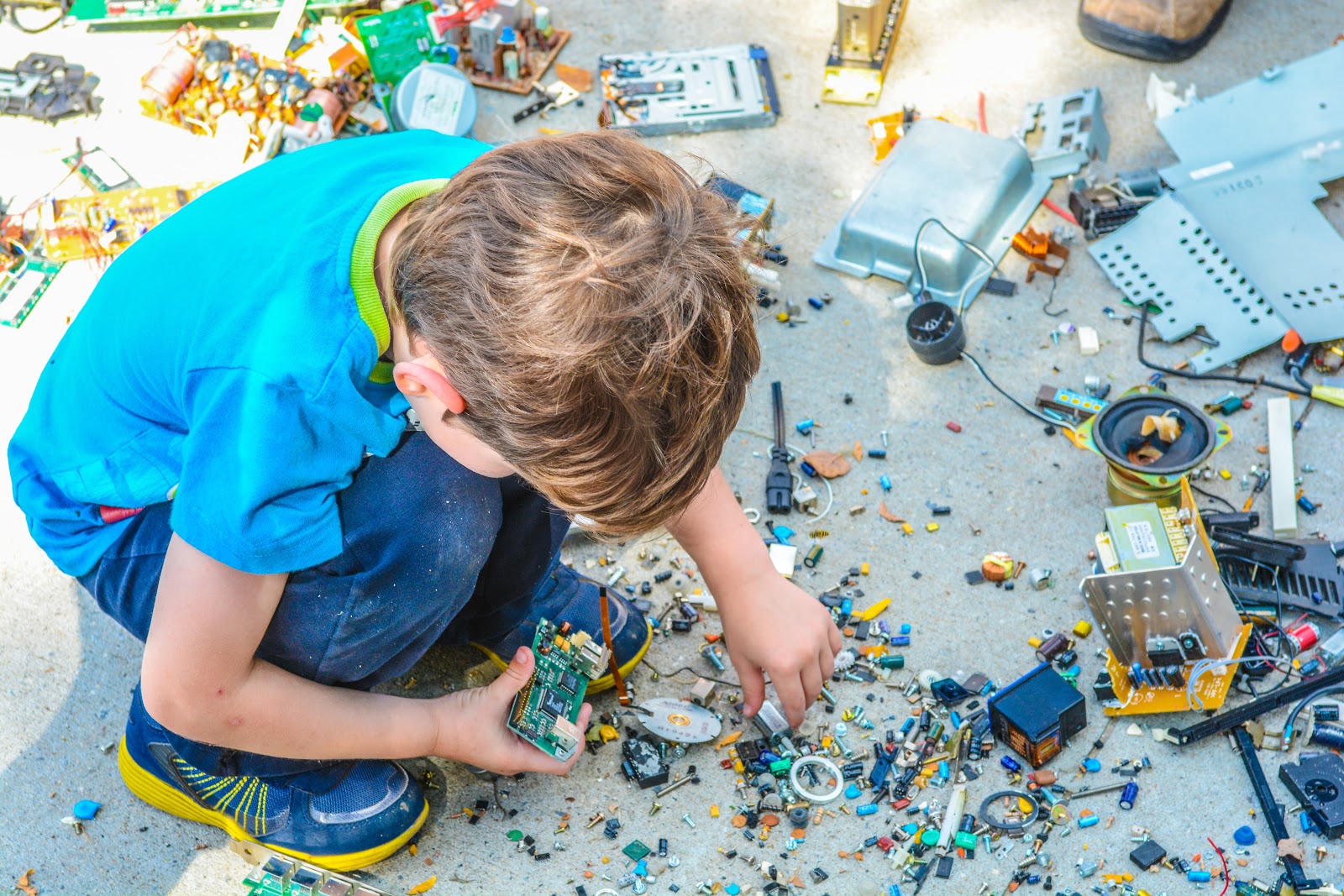
It is important to allow children time for unstructured learning, play, and virtual time with friends.
Create and Maintain Connections Even with Social Distancing
As you have probably noticed, social isolation is upon us, making virtual interactions the new norm, at least for a while. Many of us feel that we took advantage of being able to hang out with our friends and even around other strangers in person. Now, we cherish the times we get to speak with those we love.
Fortunately, we live in a digital age that makes social isolation a little bit easier on us. Luckily, your kids can connect with their friends through various online video chat applications. Balance screen time that is focused on not just watching videos, but using tech for fun interactions like digital playdates. Create stories and scripts together over Google Docs or play Minecraft or Monopoly multiplayer online while watching or listening to each other over FaceTime. It is not as ideal as being together in the same spot, but these virtual friend meetups can help the separation be more fun and bearable.
You can also get other family members in on all of the fun. Plan a virtual read-aloud with your child’s grandparents. Let your kids Facetime or video call with their grandparents or cousins. Moreover, be sure to check in on your loved ones as this is a difficult time for us all.

Allow your kids to maintain connections, even with social distancing.
Make Sure Kids Read Every Day
The benefits of reading are endless. Reading helps improve concentration, vocabulary, and language skills. Reading exercises our brains and helps develop a child’s imagination. It teaches children about the world around them and helps to develop empathy. Overall, reading is a very important skill and should be done daily.
To keep up literacy skills, it is suggested that students should read (or be read to) at least 20 minutes a day. This, however, does not necessarily mean it has to be a serious academic text. It can be a novel, an instructional manual, a graphic novel, a comic book, or even a sports magazine, so long as your child is reading. Have your kids read something they are interested in — it’ll make it more fun and they’ll enjoy it a lot more that way. Moreover, kids do not have to sit at a desk — sitting on the floor, stretching out on the sofa, or standing up to read can all make the task more engaging.
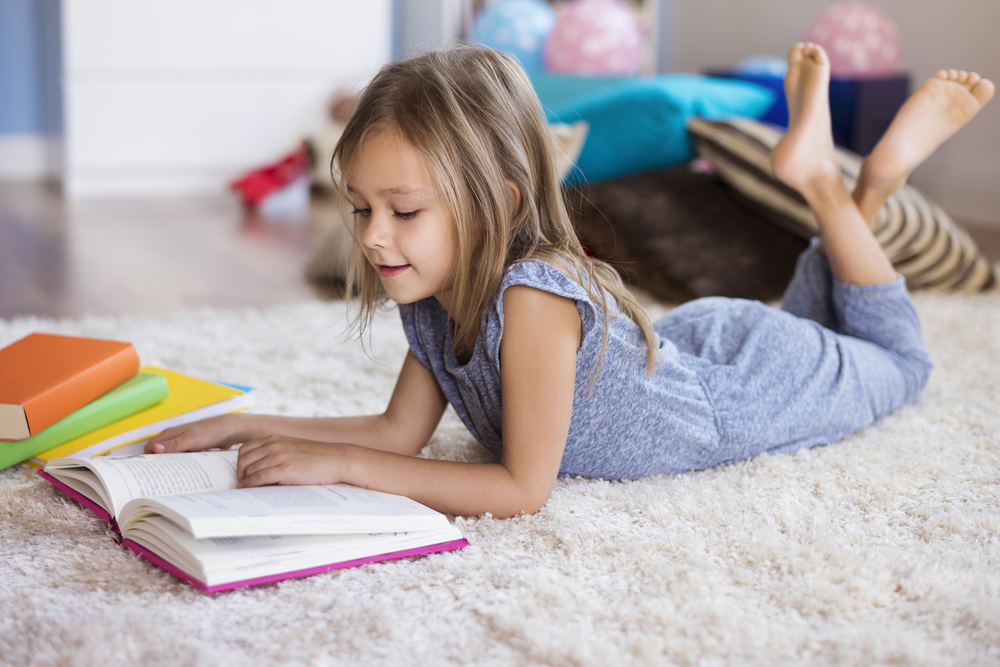
Make sure kids read every day.
Make Reading Interactive
If you really want to play teacher? Make this an interactive activity. Google ‘reader response questions,’ and you will find lists of prompts you can print out or use in conversation. Ask thought-provoking questions like “What do you predict will happen next?” or “How would you change the story?”
At iKnowABC, we understand the many benefits of reading, which is why we offer five enhanced eBooks. Put the power of reading in your child’s hands with the iKnow eBooks. Fun, interactive, and highly addicting, these books will get your child reading in no time. The iKnow School Adventure Program stimulates your children’s curiosity, encourages them to learn more about the animals and preservation of the planet, creates a mindset for favorable learning, and more. For more information on how you can sign up for your digital subscription, check out our parent page.
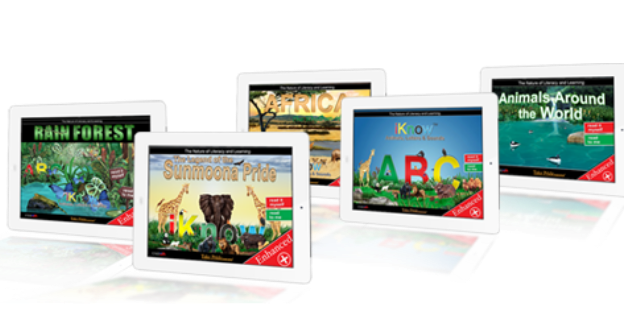
iKnowABC offers five enhanced eBooks. Fun, interactive, and highly addicting, these books will get your child reading in no time.
Apply Learning to Real-Life Problems
Your home is filled with opportunities to practice math skills, if you know where to look. You can apply skills in new unconventional ways, to make learning fun and interactive. Planning a shopping trip? Give kids a budget and let them help figure out what you can buy. Or turn a set of stairs into times-tables practice by letting kids climb while calling out multiples for each step. For instance, the first time is by twos, then by threes, then by fours. This will help with your child’s math fluency. Baking a cake? Let the kids measure out the ingredients. Building a lego set? Have the kids count the number of each color of legos they use to build each piece. Maybe your child likes to do worksheets. There are tons of worksheets available online, that apply to a number of subjects, including math. The possibilities are endless.
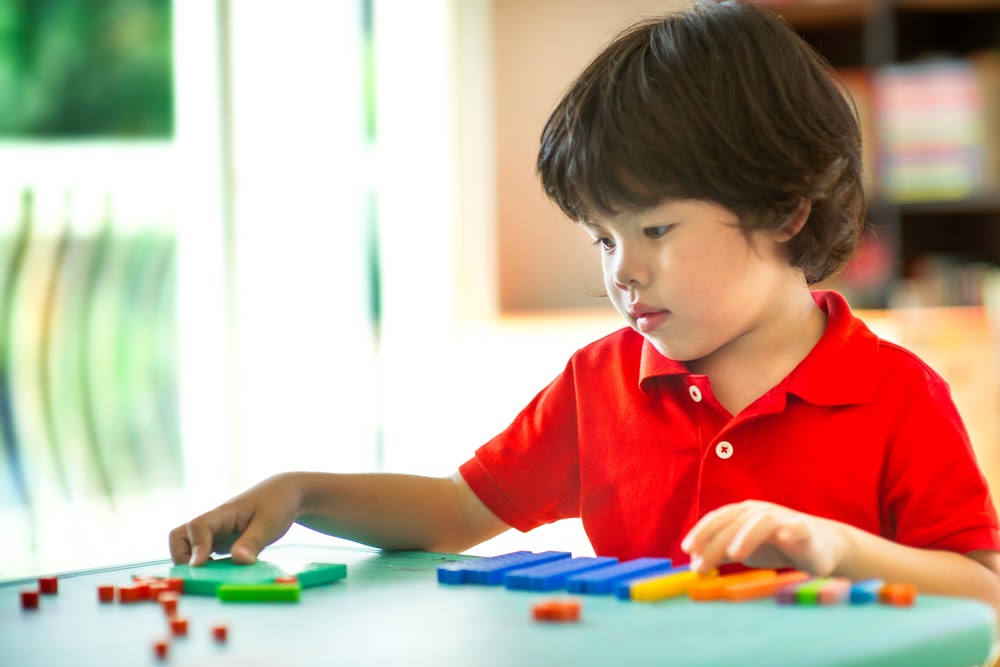
Apply math skills in new unconventional ways to make learning fun and interactive.
Have Your Kids Practice Their Writing Skills
We are living through an extraordinary time, unlike any other, the majority of us have ever experienced. Encourage your children to document what is going on in their lives. A daily journal helps kids keep track of not just day-to-day events but their thoughts and feelings about it as well. If that is not your child’s thing, suggest that they write out a skit or short fiction story.
For younger kids, this is a great time to practice writing and learning their ABC’s in fun and interactive ways. At iKnowABC, we offer printables and traceables to practice reading, writing, drawing, and coloring. We offer hundreds of different downloadable and printable pages. Moreover, our learning curriculum takes learning offline with fun activities, games, and family recipes. Each level in iKnow has its own offline activities and we constantly add more. Learn more about the various programs and activities your child can engage in here. You can also download a sample here.
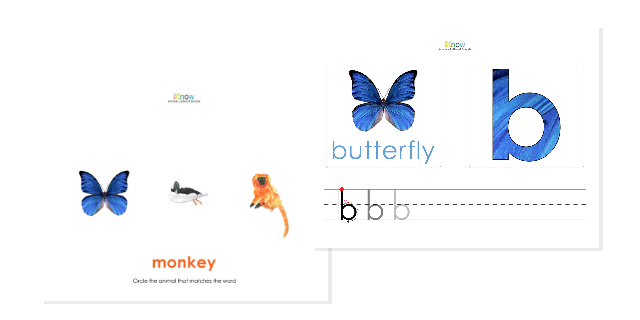
At iKnowABC, we offer printables and traceables to practice reading, writing, drawing, and coloring. We also offer hundreds of different downloadable and printable pages. Check out our website for more information.
Utilize Various Resources
Does your school distinct have online resources for virtual, distance learning? Did they send packets home? Look over what each child needs to work on and then consider how and if you are going to add to it. In addition to your child’s school district, teachers, and the parent community, there is a wide array of online resources that you can utilize as well. We are lucky to live at a time of hyper-connectivity and vast digital resources at our fingertips. Technology enables us to work and learn in ways unimaginable only a couple of decades ago.
Libraries and museums often have high‐quality and free online tools. Many museums, online education companies, and organizations are also starting to offer free or discounted programming during the pandemic. Moreover, if there is a subject matter you do not know or are not comfortable enough teaching your child, look for online tutors who are available virtually to help you. Take some time to go over a few options and consider how you can work it into your child’s assignments and/or learning materials.
Try Out iKnowABC’s Digital Programs
If you are looking for more learning resources, you can also check out our award-winning programs. We love to create custom, engaging, innovative programs for students of all ages, educators, and communities to meet and surpass their goals and objectives. Our team designs and develops new programs with you or we help you transform your existing content into a multi-modality, modern learning experience to achieve amazing results. We focus on a whole-person approach to education, inspire students to always do their best, teach critical thinking and problem solving and cultivate social growth and development. Our programs get students and teachers fired up to learn and leave them wanting more.
 iKnowABC Digital Subscription
iKnowABC Digital Subscription
The iKnowABC Adventure is a digital subscription that you can access anytime, anywhere. It is fun and effective distance learning. The Home Adventure includes a step-by-step guide for parents to teach their child beginning reading skills, science concepts, art activities, music, and more! The Digital Library includes everything you need to teach your child their ABCs. Anytime, anywhere access to fun, engaging, and educational content to delight and teach your child. Moreover, the School Adventure is the ultimate adventure with Gamified Digital Adventure, self-paced, child-directed learning experiences, phonemic awareness, phonics skills, and science concepts. To learn more about the iKnowABC program, check out our parent’s page, and sign up today.
Take your child on a fun adventure around the world as they meet new animals and learn new letters and sounds. Created by award winning teachers and selected by Moonbeam Children’s Book Awards, we are proud to have you join the iKnow family. Watch as your child’s confidence in learning grows while having fun along the way. Right now, we are offering our monthly Digital learning program for only $5/month! With this, you will get hundreds of educational videos, 200+ lessons and exercises, free eBooks to download, offline activities, and so much more. To start your adventure and join the iKnowABC Family, click here.

Join the iKnowABC family and start your adventure today for just $5/month.
“When you teach children a fact, they may or not remember it. However, when you infuse learning within a captivating story set to music – they will remember what they learned for a lifetime! That’s the secret behind the iKnowABC Adventure & App.” – Cindy Coleman, M.Ed, co-founder of Take Pride Learning®.
Be Forgiving of Both Yourself and Your Kids
This is a very stressful time with many uncertainties. Each day, remember to be gracious to yourself. Similar to the Golden Rule, which states, “treat others as you want to be treated,” treat yourself and your children the way you would like to be treated. By being kind to yourself, you will in return be more gracious to your children. No one planned for this. Everyone feels stressed and out of place. We are missing our friends, our communities, and our routines. Be sure to take care of yourself and your kids, even if it is in the smallest of ways throughout the day.
If you need to put on a movie to get through the day, that is absolutely fine. If you need to play board games and eat a pizza, that is okay too. You do not have to homeschool if it is really going to cause severe emotional distress for everyone involved. This is really important for parents to hear right now because we all feel so much personal pressure. Let go of the pressure and take some downtime. Who knows, if you take a deep breath and let loose, you may even enjoy it. Many parents did not sign up to homeschool their kids, and thus, this is a learning experience for both parents and kids. It is okay to make mistakes and get frustrated, but do not be too hard on yourself. Be forgiving to both yourself and your kids.
Do Not Be Afraid to Walk Away
If and when you get frustrated or lose your patience, take a break. It is better to know when to stop and regroup than to continue to thrash it out and take your stress out on your kid or yourself. Besides, the amount of material you will cover while homeschooling will be much greater than that covered in a typical school day. Parents should take the pressure off themselves to be the teachers and curriculum enforcers.
Take Time To Check in
This time can be just as challenging on your kids as it is on you. When your child is used to having a set routine and that all of a sudden stops, it can be hard to find the right balance. And that is what it is all about — balance — trying to keep your children in their routines and being creative about what you do with them. Keep them informed, but do not let them veg out on the news. You have to be in tune to their moods and their needs. Mental health is extremely important. Be sure to check in with your kids and your loved ones and make room for reflection as well. Even if it is walking around the block, playing volleyball in the backyard, or whatever you can do within your space, do something to make sure that they are okay.
Take Time to Reflect
We know that this difficult period will not last forever and our lives will return to normal someday, but taking time to reflect on this historic occurrence can be helpful to endure the experience now and to remember it in the future. Encourage your kids to keep a daily journal, draw or take pictures, and collect or print news clips to record this profound event. Or even make a video journal, where each day you hold up a sign of what day it is and take a few minutes of video and commentary on the state of your child’s small world. Then, they can show their grandchildren what it was like to live through the great pandemic of 2020. Moreover, if your child isn’t able to write yet, have them tell you what they are experiencing and write it down for them. Meanwhile, you can have them work on their writing skills with the iKnowABC program.
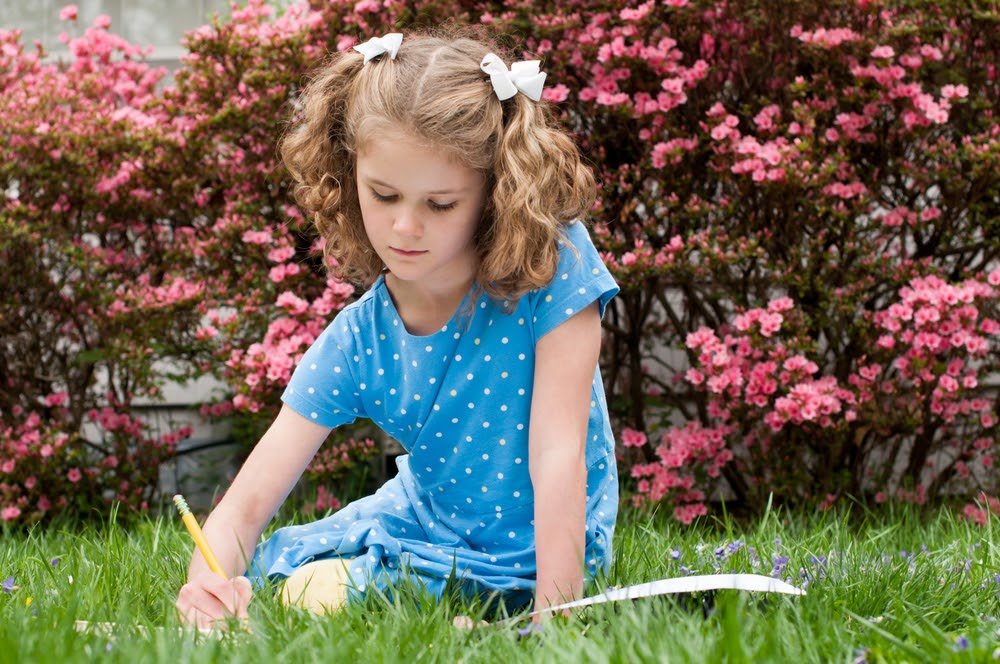
Take time to check in with your kids, reflect on their experiences, and have them document how they are feeling.
Put Family First
While continuing your child’s education is important, taking care of yourself and each other should be above all else. Academic success is important, but it should not take precedence over your family. Being together constantly means sharing the good and bad. And being in quarantine means that you are always together. Even if homeschooling is temporary, it is important to create a loving, supportive, and safe environment for your children.
This is a once in a lifetime moment to gather together as a family and connect in deeper, more authentic ways. Reading books, listening to music, enjoying unrushed meals, playing board games and card games, and going for walks outside can all be ways to enjoy quality time together. Maybe you’ve always wanted to learn how to draw or to bake. This can be an amazing opportunity to explore these interests as an adult, and prompting your children to explore their interests as well.

Be sure to embrace family time and to put family time first as this is a unique experience we are all going through.
Being thrown into homeschooling your kids in the midst of a pandemic is not easy. And it is something none of us could have ever predicted. But with a little preparation and some faith, you can make this a positive and memorable experience for both you and your children.
Learn more about Take Pride Learning® and iKnowABC. Help your child learn their ABCs and take home the success of an award winning classroom education – start your adventure today!

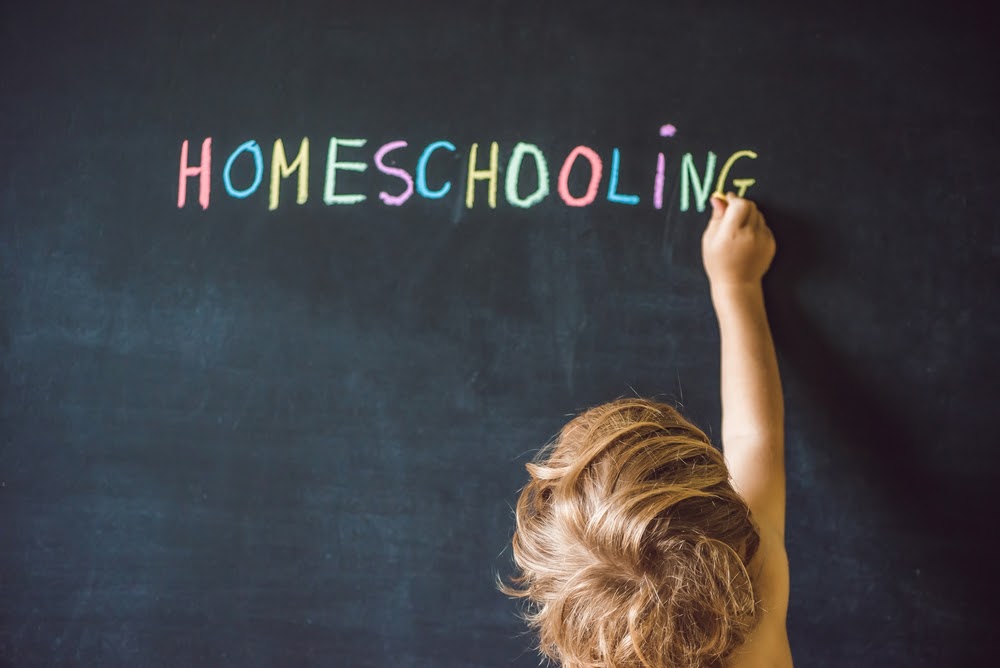


 Copyright © 2013-2020 Take Pride Learning. All rights reserved.
Copyright © 2013-2020 Take Pride Learning. All rights reserved.